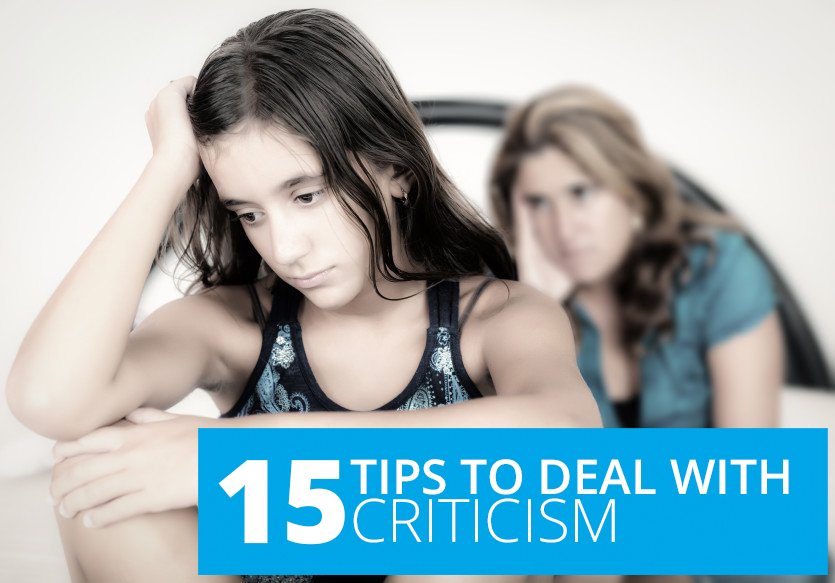At the end of the day, when Lori Deschene feels completely exhausted, it often has nothing to do with all the things she has done. It’s not a consequence of juggling multiple responsibilities and projects. When she’s exhausted, you can be sure she’s bent over backward trying to win everyone’s approval.
I’ve obsessed over what people think of me. I’ve assigned speculative and usually inaccurate meanings to feedback I’ve received, and I’ve lost myself in negative thoughts about criticism and its merit. I work at minimising this type of behaviour – and I’ve had success for the most part – but, admittedly, it’s not easy.
I remember taking a summer acting class back in college. I actually made the people around me uncomfortable with my defensiveness. One day, the teacher was giving me feedback after a scene in front of the whole class. She couldn’t get through a single sentence without me offering some type of argument. After a couple minutes of verbal sparring, one of my peers actually said, “Stop talking. You’re embarrassing yourself.”
Looking back, I cut myself a little slack. You’re vulnerable in the spotlight, and the student’s reaction was kind of harsh, but I needed to hear it. Because I was desperately afraid of being judged, I took everything, from everyone, as condemnation.
I realise criticism, when it comes from people who are legitimately trying to help, is rarely gentle. A lot of the feedback we receive is unsolicited and doesn’t come from teachers – or maybe all of it does. We can’t control what other people will say to us, whether they’ll approve of our actions, or form opinions and share them. But we can control how we internalise, respond to, and learn from criticism, and, perhaps most importantly, when we release it and move on. If you’ve been having a hard time dealing with criticism lately, it may help to remember the following:
1. Looking for seeds of truth in criticism encourages humility. It’s not easy to take an honest look at yourself and your weaknesses, but you can only grow if you’re willing to try.
2. Learning from criticism allows you to improve. Almost every critique gives you a tool to more effectively create the tomorrow you visualise.
3. Criticism opens you up to new perspectives and ideas that you may not have considered. Whenever someone challenges you, they help expand your thinking.
4. Your critics give you an opportunity to practice active listening. This means you resist the urge to analyse in your head, planning your rebuttal, and simply consider what the other person is saying.
5. You have the chance to practice forgiveness when you come up against harsh critics. Most of us carry around stress and frustration that we unintentionally misdirect from time to time.
6. It’s helpful to learn how to sit with the discomfort of an initial emotional reaction instead of immediately acting or retaliating. All too often we want to do something with our feelings – generally not a great idea.
7. Criticism gives you the chance to foster problem-solving skills, which isn’t always easy when you’re feeling sensitive, self-critical, or annoyed with your critic.
8. Receiving criticism that hits a sensitive spot helps you explore unresolved issues. Maybe you’re sensitive because you’re holding onto something someone said to you years ago, something you need to release.
9. Interpreting someone else’s feedback is an opportunity for rational thinking. Sometimes, despite a negative tone, criticism is incredibly useful.
10. Criticism encourages you to question your instinctive associations and feelings. Praise is good, criticism bad. If we recondition ourselves to see things in less black and white terms, there’s no telling how far we can go.
11. Criticism presents an opportunity to choose peace over conflict. When criticised, our instinct may be to fight, creating unnecessary drama. The people around us generally want to help us, not judge us.
12. Fielding criticism helps you mitigate the need to be right. Nothing closes an open mind like ego – bad for your personal growth and damaging for relationships.
13. Your critics give you an opportunity to challenge any people-pleasing tendencies. Relationships based on a constant need for approval can be draining for everyone involved. It’s liberating to let people think whatever they want – they’re going to do it anyway.
14. Criticism gives you the chance to teach people how to treat you. If someone delivers it poorly, you can take this opportunity to tell them, “I think you make some valid points, but I would receive them better if you didn’t raise your voice.”
15. Certain pieces of criticism teach you not to sweat the small stuff. In the grand scheme of things, it doesn’t matter that your boyfriend thinks you load the dishwasher “wrong.”
“Criticism is something you can easily avoid by saying nothing, doing nothing, and being nothing.” – Aristotle




